 You’re not alone if the term “money laundering” brings to mind images of washing machines, dryers, and laundry detergent. After all, laundering money is the process of making dirty money appear to be clean—but just not in the way you might be thinking of. Here is a brief explanation of money laundering and why it matters to you.
You’re not alone if the term “money laundering” brings to mind images of washing machines, dryers, and laundry detergent. After all, laundering money is the process of making dirty money appear to be clean—but just not in the way you might be thinking of. Here is a brief explanation of money laundering and why it matters to you.
Clean vs. Dirty Money
Let’s break down some terms. “Dirty” money refers to funds that have been obtained unlawfully. This includes money that has been stolen, counterfeited, or earned through illicit activity (drug trafficking, illegal sales, human trafficking, etc.). In order to avoid suspicion, those who make money by committing these crimes need to make it look like their money is “clean,” or earned legally and legitimately.
Laundering
“Laundering” is the process of making dirty money look clean. There are different methods of doing this, some more complicated than others. For example, some criminals might open several accounts at different financial institutions. This allows them to break down large cash deposits into smaller, less conspicuous amounts. Then, they can make little deposits into each of their different bank accounts. This technique is called “structuring” or “smurfing.”
On a more sophisticated scale, a criminal organization might open up an entire business, such as a restaurant, store, or casino. This allows the criminals to make it look like their dirty money is actually coming from customers. Then, they can carry out larger transactions through their bank accounts without drawing too much attention to themselves. A business that exists to help criminals launder money is known as a “front.” With modern-day technology, fronts can also exist online in the form of gaming businesses or retail shops.
How It Affects You
The crimes committed for financial gain are bad enough in and of themselves. Once criminals are able to successfully launder money, it allows those crimes to continue. This can affect everything from the economy to the level of crime in your neighborhood. Counterfeit money, for example, can decrease the value of real money and contribute to inflation. Illegal front companies can compete with legitimate businesses and have unfair advantages over them, affecting your economy. Drug and human trafficking organizations can grow and expand their influence in your city.
On an even more personal level, criminals can trick you into becoming a “money mule.” A money mule is someone who launders money for someone else, sometimes without even knowing it. Believe it or not, there are more unsuspecting money mules out there than you might think. The good news is there are ways to protect yourself from becoming a victim. Check out our next blog post to learn how you can fight back against money laundering and avoid becoming a money mule yourself.



